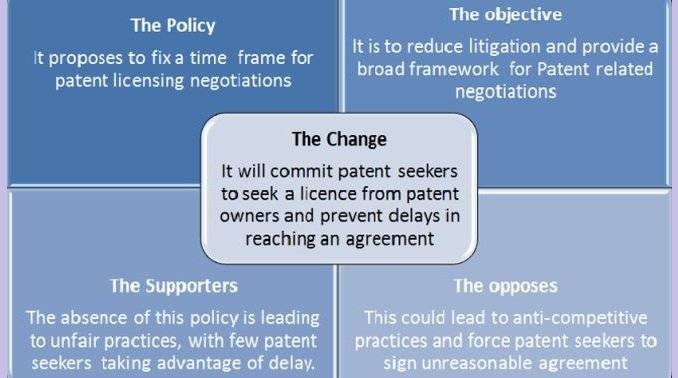This post was first published on 18th August, 2014.
A heated debate has erupted between the Tech Giants about the newly proposed amendment in the Indian Patent act. The Tech industry is discussing the pros and cons of implementing the suggested change.
What is proposed in this new changed policy?
The new policy that is proposed aims to protect essential patents in the technology space. It is called the Intellectual Rights Policy and it proposes to set a framework for the licensing of essential patents in India.
What are the points of difference between the old policy and the new one?
The key point of difference is the rule that states that the patent owner and the company that wants to build a product using that specific patent will have to reach an agreement on royalty payments in 6-12 months. Negotiations will have to be conducted under Fair, Reasonable, and Non-Discriminatory (FRAND) terms, which essentially means that the patent owner will broadly offer similar terms to a potential licensee as to any other existing licensee.
What pros and cons are detected?
One side’s point of view is that it tilts the balance of power in favor of patent owners. The essential patent owners will be able to file for an injunction even when the terms of licensing are unreasonable. Such an injunction would mean that the company that is seeking the license will have to stop selling its products. This could facilitate anti-competitive practices. The other side, however, says that because the negotiations will be under the FRAND terms, there is no scope of offering unreasonable terms. It is believed that the policy will, in fact, engender more licensing, leading to more products.
“The big difference this policy will make is that it will bring the license seeker and the patent owners to the negotiating table with a fixed timeline. Currently, there are companies that continue to infringe patents for years”, said an executive, backing the policy.
Who is for it and who against?
Nokia, Qualcomm and Ericsson favor this rule. Microsoft, however, is against it.
What is being done regarding the raised concerns?
Senior Department of Telecom officials said that all companies had agreed to the Draft Policy’s wording at a meeting held on July 17, 2014. So the concerns raised by Microsoft in the letter dated August 1, 2014 have to be looked into.
Let’s wait and watch this tug of war!
Reference: Source



